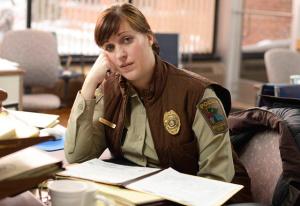
My sentiments exactly, Molly. Credit: Chris Large/FX
This is a serious question I have been asking myself for a while now. Of course, I am a feminist and I do like Fight Club, so there’s an easy answer to the question. But have I been so brainwashed by the male gaze that I can’t see fiction through the critical lens it deserves? I was watching season 1 of Fargo on a trans-Atlantic flight a couple weeks ago, and I found myself thoroughly entertained. I also found myself feeling guilty for enjoying something so male, white, and heteronormative.[1] (Allison Tolman is great, but she doesn’t make up for it.)
Obviously this is the standard for fiction in all its forms, and anything else is given a special interest label—“chick” and “urban” among my favorites—and made into a “genre” (and thus deemed inferior). Such books are pushed into the corners of stores and such movies are advertised on Lifetime, BET and Logo, so hetero white men don’t have to know they exist.
Diversity in film recently has been addressed by The Academy of Motion Picture Arts and Sciences. There are a lot of reasons why diversity is important, but one of them is simply that having more variety makes for better quality of art overall. I don’t know about you, but I feel like I see the same movies and TV shows and books over and over again. I understand that for publishers and studios trying to fatten their pockets, doing something new is risky, but I’m bored with remakes and reboots and retellings.
Mostly.
My problem is that occasionally something will come along that I really like even if it’s reminiscent of the same old thing.
